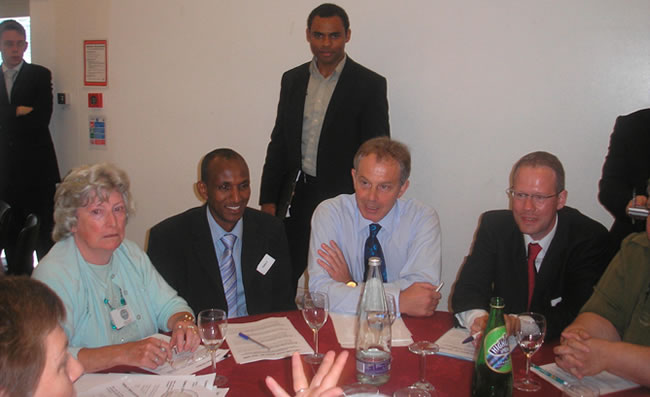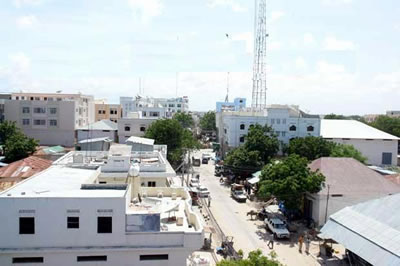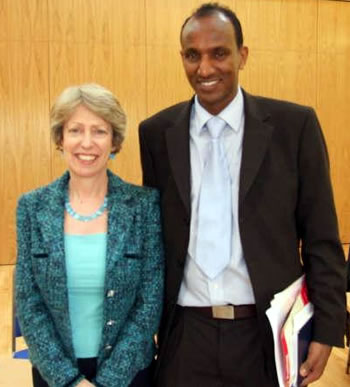fiogf49gjkf0d

Kaysar Mohamed meeting with Tony Blair

Bristol’s 15,000 Somalis make up not only the city’s largest African community, they also form the biggest group of racial attack victims here. Barney Cullum casts the spotlight on Bristol’s most misunderstood minority.
 |
| "If you think Stapleton Road is dangerous, you should try down town Mogadishu" says Kaerry McCarthy, MP |
“If you think
Stapleton Road is dangerous, you should try down town
Mogadishu,” says Kerry McCarthy, gazing into the middle-distance as she recalls her unforgettable trip to the sharp edge of the horn of
Africa. The Labour MP is a lady well placed to make such a comparison having represented Bristol East as an MP since 2005 and after visiting
Somalia, of which
Mogadishu is the lawless war-torn capital, just last summer. This Bristolian journalist, in contrast, has visited several African countries but is yet to brave the country that makes Zimbabwe look like the potential holiday destination Robert Mugabe’s country once was.
The British Foreign Office had warned Kerry they considered Somalia the most dangerous country on earth, bar none, but she went nonetheless, the most important leg of a whistle stop reconnaissance tour of Africa’s Eastern most tip that also took in Ethiopia and Kenya.
Bristol has overtaken Sheffield to become the fourth most popular destination in the UK for Somali immigrants, behind only London, Manchester and Cardiff. From St George to St Pauls and from Stapleton to Southville, Bristol in the 21st century is a sea of Somali faces.
Most of the Somalis that have made Bristol their home in recent times have come from the northern region of the country, a now peaceful area called Somaliland, formerly known as British Somaliland. Indeed, it was Somaliland that the MP was most keen to explore, to see where so many of her neighbours were born. “I confess that while I had heard of Somalia I didn’t know anything about Somaliland before I got elected,” says Kerry.
Somaliland is a relatively safe place to visit, but as someone who had known little to nothing about the area before her first trip, Kerry was understandably nervous: “The difference between Somalia and countries like Uganda and Sudan is that the tribal warfare is so spread out. There is total lawlessness and nowhere to turn if you’re in danger. There is no police force and no effective protection from the army. People literally get shot at random every single day.”
There has been a power vacuum is Somalia since 1991, which has seen various tribal, religious and political factions jostling for power as the impotent and unwanted TFG (Transitional Federal Government) looks on. The scale of the violence recently led the United Nations to describe the situation in Somalia as “far worse than Darfur” and, in fact, “the world’s worst humanitarian emergency.”
Set against this backdrop, no one could argue with a Somali’s decision to flee his country and hopefully precious few could argue with Kerry’s government granting asylum to those from the most dangerous parts of Somalia. Yet a question with a perhaps less immediately obvious answer is why do so many Somalis choose the UK, and particularly Bristol, for their new home? Kaysar Maxamed is a Somali mental health worker from St Pauls who edits Bristol’s Somali Voice newspaper and the website of the same name: “The first Somalis that moved to Europe were seamen who docked up in places like Bristol and Cardiff in the 1950s and took advantage of the greater work opportunities in the UK,” Kayse explains. “They also fought for Britain in the wars in Burma and the Falklands and the older people of Bristol remember that.”
 |
|
Kaysar Mohamed and Minister of Health |
Somali asylum seekers end up all over Europe: in contrast to popular perception,
Britain only houses 3% of the world’s asylum seekers. It is natural, then, that once EU passports are obtained many Somalis want to move to areas where they have historic family ties.
Not only are Somalis resourceful and adaptable, they are often praised for a seemingly innate propensity for entrepreneurship. As Kayse proudly reports, Somalia’s economy is growing in spite of the ceaseless civil conflict and in contradiction to the majority of Africa. “We have the best cell phones in Africa in terms of choice, cost and availability and we have our own national airline chartering flights from Mogadishu to Gatwick and Cardiff every day. How many small African countries can say that?”
“Somalis want to work and though we are never rich we do like to try and make money. In other European countries you have to apply or train for a license to do so many things, whether it’s to open a restaurant or to cut people’s hair. In England, if you save up the money, in factories or whatever, it doesn’t matter who you are you can open up a barbers or something like that straight away.”
Even for those without the gift for business, there are many opportunities for Somalis in Bristol to make a living. Apart from the many Somali taxi drivers that have served all of us at one time or another there are 300 Somalis working at Creda in Yate and likewise Somalis make up 80% of the workforce at Filton’s Royal Mail sorting office.
Mahmoud Matan, a community cohesion officer for Bristol City Council, also waxes lyrical about Somali graft, comparing his countrymen favorably with Bristol’s Polish workers: “Somalia and Poland may seem dissimilar but the people from these countries find they have much in common when they come to Bristol in terms of fighting for jobs and overcoming language barriers and they all just want to work.”
Mahmoud insists that that he has seen the Somali reputation within Bristol improve, claiming that Polish immigrants get a far harder time now. Tensions between Somalis and the Caribbean community have also cooled down recently: “There is a lot less suspicion between each group now. There is growing respect. Everyone knows that Caribbeans have been in Bristol longer, but now there is greater awareness from them about why we need to live somewhere too.”
The Somalis I speak to are positive, but there is still more that Bristol could do to make its thousands of Somalis more welcome. Bristol City Council’s Equality Report for 2007 recorded that the largest group of victims of racist attacks were Somali, with 88 incidents (20.14%).